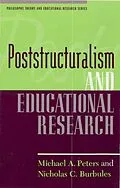Poststructuralism, and its implications for something called ''postmodernism, '' is a major topic of discussion in social theory and research generally, including educational research. The works of the major authors in this tradition (Foucault, Lyotard, Cixous, Derrida, Haraway, to name a few) are challenging and difficult. Yet more and more theorists and researchers in educational scholarship use this term to describe their work. What does poststructuralism mean for these authors, and what significance does it have for educational inquiry? This book takes on these central questions and explores the impact of poststructuralism in language that makes the basic issues at stake accessible for a broad readership. Michael Peters and Nicholas C. Burbules highlight the implications of a poststructuralist stance for the conception of the research subject and examine its standards of validity and methods of investigation. They also lay out the distinguishing characteristics of this approach to educational inquiry, using as examples the particular ways in which writers (including Giroux, McLaren, Lather, and Ball) have tried to incorporate the poststructuralist perspective into their investigations of educational issues. The emphasis throughout this book will be on making these complex theoretical issues tangible and salient for the educational researcher
Autorentext
By Peters and Burbeles
Inhalt
Part 1 Series Preface
Part 2 Acknowledgements
Part 3 Introduction
Chapter 4 What is Poststructuralism?
Chapter 5 Poststructuralism and the Aims of Educational Research
Chapter 6 Poststructuralism, Educational Research and Methodology
Chapter 7 New Practices of Reading and Three Exemplars
